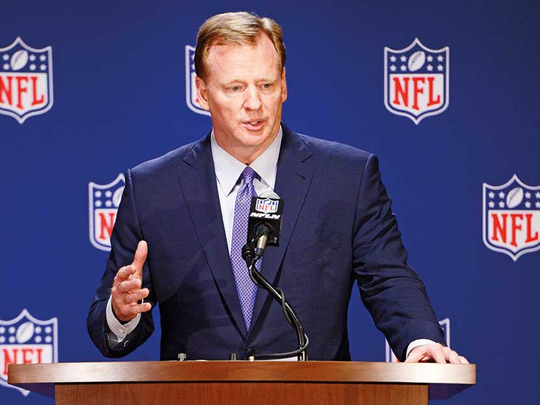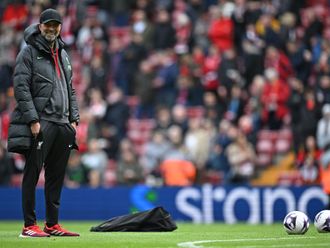
Boston: NFL Commissioner Roger Goodell has the most powerful job in sports and among the most challenging.
Whether it’s the national anthem controversy, the fight over suspending Dallas Cowboys running back Ezekiel Elliott, or the constant drive to make football safer, he understands that he can never please everyone. Nor does he try.
“It’s impossible to make everyone happy,” Goodell said. “But I don’t think there’s anything you can do in life where you can please everybody — particularly in the world we’re living in today. But I don’t think that’s the objective. It’s obviously not impossible to manage a successful league like the NFL. We’ve proven that.”
“The NFL’s popularity, the fact that it appeals to so many people, it’s such a big stage, it’s so relevant to society and has such influence, those things probably magnify any issues we have,” he said. “That’s OK. I think people have very high standards and expectations for the NFL, and that’s particularly OK. We want that.”
Goodell recently talked about these and a wide range of other topics in an interview with The Times. He discussed the future of the league, as well as the challenges, opportunities, and even the lighter side of one of the most high-profile jobs around:
For the first time in more than 20 years, the Los Angeles area has two teams. Did the NFL build growing pains into the equation? How long do you think it will take the Rams and Chargers to really take root in this challenging market?
That’s nothing we didn’t know; it’s a challenging market. The size, the fact that it’s the entertainment capital of the world, the fact that we haven’t been there in 20 years. We’re building a world-class stadium that’s going to be part of that experience. That’s not constructed right now. So there’s a transitional phase until we get into that facility and the teams have had a chance to really market themselves and earn the support and respect of their fans.
The vast majority of fans consume the NFL from the couch. With people watching more and more on mobile devices, is TV becoming a thing of the past?
I don’t think television is going away. Most experts will tell you that it’s going to continue to be the most dominant platform for years to come, but you have to be on all those other platforms. Because consumers, particularly the younger demographics, are consuming on their phones or tablets or other forms of mobile devices.
Your stance on reducing the number of pre-season games is well known. How soon could such a reduction happen, and what’s standing in the way?
We have the ability to change the pre-season length, in the sense that we could reduce it. We’ve discussed this with the competition committee for several years, about how many pre-season games are necessary from a pure football standpoint. Football people recognise that you could get the team ready in the preseason — evaluate players, develop players, create your team culture — with three preseason games. You may want to go to more joint practices, for example, because you can get a lot done. There are always discussions about roster sizes. All of that is the subject of collective bargaining. But remember, we had six pre-season games in 1978. Now we’re at four. That could be two sometime in the future.
How soon until there’s a GPS chip in the football for marking the exact spot or determining when it has crossed the goal line?
I always bet on technology. Technology we never dreamed would occur will occur. So I believe there will be a solution to the ball. I don’t know when it will be. I’m not going to make that projection. But I do believe there will be a solution to that.
A recent survey said the national anthem protests have impacted ratings. Do you buy that?
I’ve said to you before, and I’ve said it publicly, that I think a variety of things impacted our ratings. I don’t buy any one particular reason, and we don’t dismiss any reasons. Our job is to address all of those. We don’t subscribe to one theory.
You get booed at places like the draft. Then, when you get up close to people they want selfies, autographs, positive interactions. Any slice-of-life examples of people doing that 180-degree turn?
When I first became commissioner, I remember [NBA commissioner] David Stern and [NHL commissioner] Gary Bettman pulling me aside and saying, “You haven’t experienced a draft boo yet.” I was looking at them and I didn’t even know what they were talking about. They said that it’s just traditional. If you go back and look at it, David Stern was booed at every draft except the last one. They started to cheer and he said, “No, no, no. Don’t do that.” It’s part of being a commissioner. Pete Rozelle told me a long time ago, “They don’t cheer for commissioners.”
— Los Angeles Times











